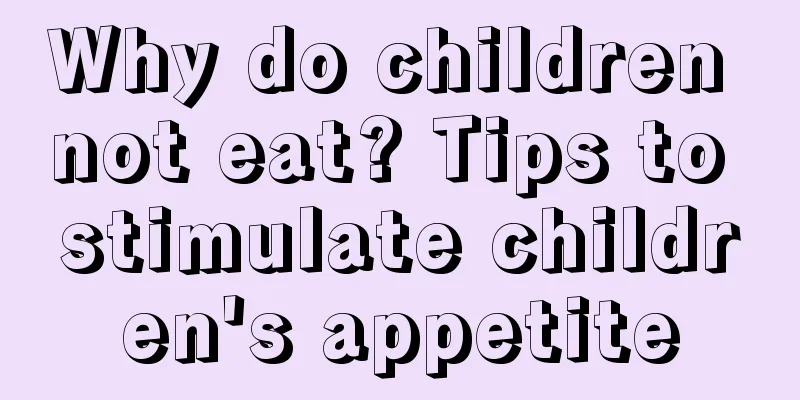The importance of kindergarten-primary school transition What does kindergarten-primary school transition include?

|
Many children have difficulty adapting to the transition from kindergarten to primary school. Children who have just started primary school need to develop not only the habit of going to school, but also the awareness of independence. Therefore, the concept of transition from kindergarten to primary school has been deeply rooted in the hearts of parents. Today, let's talk about the importance of transition from kindergarten to primary school. The following should be noted in the transition from kindergarten to primary schoolIf the mother is worried every day about whether the child eats well and sleeps well before the child is one year old; if the mother of a three-year-old child is mainly worried about the child's behavioral habits and whether he can adapt to kindergarten, then when the child grows to 5-6 years old, it is actually a very worry-free stage. The child's overall mood is much more stable than when he was young. He will no longer stick to his mother all day, but likes to play with other children. His behavior is becoming less and less worrying, and the mother can start to do many things she likes with confidence. Therefore, both the baby and the mother will be relatively comfortable at this stage. However, after all, every age group has its own confusion and anxiety. For children aged 5-6, the biggest anxiety comes from further education. The children are about to go from kindergarten to primary school. Whether to make the transition from kindergarten to primary school, whether to cultivate children's study habits, and how to cultivate them have become the most troubling issues for parents. First, let's look at the personality characteristics of children. Children aged 5-6 can definitely be called angels. Compared with children aged 3 or 4 who are in their first rebellious period and cry and throw tantrums at the slightest provocation, and children aged 7, 8, and 9 who are hated by dogs, children aged 5-6 can definitely be described as sweet. They are very well behaved and obedient most of the time. For example, they will actively help with housework, help serve dishes and set the tableware during meals, and say "Mom, let me help you wash the dishes" after meals. Even when eating snacks or chocolate, they will no longer do it on their own, but come to you and ask: "Mom, can I have a piece of chocolate?" Every time you praise or compliment him, he will be very happy. He will also show that he loves to study. He especially likes to pester you to read books, likes you to talk to him and teach him skills. He also likes to show off what he has learned, likes to tell his mother which words he knows, and likes to write his own name. Sometimes even if you force him, he will not resist, but will obey obediently. When I take him out to play with his friends, I feel that he is no longer the little bad boy who loves to fight and cause trouble. He has become sensible. When he sees other children fighting, he will criticize them and say that it is wrong for them to do so. If he is beaten or bullied, he will no longer solve the problem by himself like before, but will reason with the other party or simply tell the other party's mother. These behaviors will make mothers feel very relieved: our baby has grown up and become sensible. Of course, sometimes children will have emotions and insist on their own things, but overall they have become easier to communicate with. If we have to talk about problems, the biggest problem of 5-6 year old children is their competitiveness. They care a lot about winning or losing. If they win, it's like they won 5 million. If they lose, they will cry and it sometimes takes a long time to comfort them. Because they care about the results, they will also habitually shirk responsibility. They will deliberately make excuses to say that it was not their fault even though it was clearly their own fault. Many mothers will criticize or even punish their children at this time, always thinking that if they do not teach them the right attitude, they will become bad. In fact, this is a normal growth stage for children. They begin to understand their own abilities at this time. They know what they are sure of and what they are not. So the games they play with you are all things they feel sure of. Under such psychological expectations, they think winning is a natural result, just like you praising him for being a good child, which makes him feel happy. But the child had never expected the result of losing, and he had never imagined such a possibility. So when the result of losing appeared, it was much more than he expected, so he would naturally be very sad. The child would cry and make a fuss. This is a normal process of releasing pressure. At this time, do not blame the child for crying and losing. If possible, try to let the child win more, because winning will make the child feel that my judgment is correct, and self-confidence will be easier to build. When the child loses, do not criticize him for not being able to afford to lose. Instead, empathize with him and tell him that the current result may exceed his psychological expectations. Help the child name this uncomfortable emotion and let the child vent his dissatisfaction with himself. Generally speaking, children between the ages of 5 and 6 are cheerful and sweet, and this stage is also the sweetest and most harmonious stage in the parent-child relationship. If children are not required to have academic pressure, everyone will feel that it is wonderful. However, life is always a little unsatisfactory. In such a harmonious time, they have to go crazy because of studying. Children at this stage face the real pressure of going from kindergarten to primary school. If they want to go to a good school, they must have enough knowledge reserves. Therefore, learning about the transition from kindergarten to primary school is particularly necessary. Regarding the transition from kindergarten to primary school, I believe everyone has heard various opinions. Some say that the transition from kindergarten to primary school is unnecessary and supports zero-based enrollment. Others say that the pressure in primary school is too great and the homework is tight, so they must learn first. My opinion is that the transition from kindergarten to primary school should be done in moderation. Basic literacy, writing, English, and math enlightenment must be done. Some mothers worry whether it will hurt their children if they are allowed to transition from kindergarten to primary school in advance. The answer is no, because 5-year-old children already have sufficient learning ability. In mathematics, children have a basic concept of time, can tell the days of the week, today is the day of the week, can understand the calendar, and master addition and subtraction within 20. Children like to play with clocks at this time. Although they may not recognize clocks, they already know what they should do when the long hand points to a certain number. He also has a good sense of direction. He can do well in moving forward, backward, up, down, from left to right, and from right to left. In terms of language, children at this stage like to read and have their own favorite books. At the same time, they already have simple logical reasoning skills and a strong desire to express themselves. So at this stage, mothers can let their children read more picture books while reading with them. First, look at the pictures and let the children make up a story based on the pictures. Then read the text and let the children listen and feel it. Finally, read the author's text while looking at the pictures. At the same time, ask the child some related questions based on the story. In this way, the child's observation ability, logical reasoning ability and thinking ability can be fully cultivated. At this stage, the child will also show a strong desire to learn words. At this time, the mother can take advantage of the child's characteristics and consciously teach him to learn words. In terms of English, I suggest that parents must listen more at this time, let their children learn some basic conversations, learn the 26 letters, and recognize and remember some commonly used words. These are the abilities that children have. However, I believe that when it comes to learning, many mothers are not crazy about what abilities their children have, but about their children's poor learning performance. Children often write mirrored characters, lack concentration, write crooked characters, etc. Many parents think that when their children have these problems, they are not serious and not focused enough. A mother told me before that when she taught her child to recognize Chinese characters, if there was no punishment, the child would be lucky if he could remember two out of ten characters. If she sat next to him with a stick and hit him on the hand if he didn't remember, the child would remember it almost immediately. In fact, whether a child has mastered the knowledge firmly or not is not because the child is not focused, but because the child may really lack ability. Take the case of children who often write mirror words. Children at this stage are particularly prone to mistaking b for d and writing 6 for 9. Parents are usually patient after teaching them once, but they will definitely start to get crazy after teaching them the tenth time. In fact, the reason for this situation is not that the children are not serious, but that their visual ability is insufficient. They are in the process of left-right confusion and identification, and their visual ability is still focused on the local area, without the overall awareness, so they are particularly prone to confusion. Along with the confusion of left and right vision, there is also a lack of hand-eye coordination. So at this stage, if the child writes crookedly, writes large characters, and writes in an irregular manner, this is normal. This is a manifestation of lack of hand-eye coordination, and most children are like this. At this time, mothers should not blindly criticize children to write small and straight characters, but practice hand-eye coordination to improve their coordination. In terms of attention, many mothers will find that their children seem to lack concentration. Especially if they go to some preschool tutoring classes, it is very likely that other children can sit still and sit upright, but the teacher will specifically tell you that your child cannot concentrate, is easily distracted, and often twists his body or talks to the children around him. When the teacher tells you this, of course the mother will feel very heavy-hearted and worried about whether her baby has a problem. In fact, this is normal. If you go to a class, you will find that most children are like this. If the child is a boy, the performance will be worse and more active. The reason for this problem is that boys have more visual ability advantages. Nowadays, many teaching methods are mainly based on speaking. Boys have poor language comprehension ability and it is not easy for them to understand the meaning, so they are more likely to be distracted. Another reason is that boys have more active hormone secretion. This growth hormone requires them to have sufficient athletic ability and needs them to release it through various sports. If children do not exercise enough, their growth hormones will not be released, and they will move involuntarily after sitting for a while. So when children are criticized by teachers for not being good enough, parents should first have an accepting attitude and know what the basic situation of the children is. As long as the children are not too out of line, they don't need to care too much. Of course, I also know that everyone hopes that their children will have a smoother transition from kindergarten to primary school, stronger learning ability, and better concentration. So next I will share with you some ways to improve concentration. First of all, you must take your child to exercise more. This exercise does not mean taking your child to the garden and letting him run around and play with other children. It means regular exercise. Children must be able to do all the exercises required by the kindergarten. Children aged 5-6 can do some jumping, hitting the ball, riding a bike, or long jump, high jump, stand on one leg, pull up on the horizontal bar, etc. If possible, you can also let him learn ball sports such as badminton and tennis. On the one hand, these exercises can help children release excess hormones. After the hormones are released, children can sit still more easily. On the other hand, they can exercise children's muscle strength and hand-eye balance. Muscle strength can control whether a child can sit still. When a child has sufficient muscle strength, his hand will hold the pen more firmly and his handwriting will be better. In addition, when a child's hand-eye balance is strengthened during exercise, the child will write more freely and his handwriting will look better. The second is to take your child to do some visual exercises. Let the child draw, cut paper, and color. Teach the child to color from top to bottom, from left to right, and do not color outside the frame. These will exercise the child's vision and enhance the hand-eye balance ability, so the child's mirror writing will improve faster. I recommend the books of Kumon or Duo Huhui for related exercises. The third is to let the child listen to the story, and be sure to read and ask questions at the same time. You can ask the baby what is in the picture and what he is doing while telling the story, so that the child can learn to observe and think while listening, and his attention will naturally be focused in the process of thinking. Fourthly, learning must be based on the actual situation of the child at this stage. Let the child learn reading, Chinese, mathematics, and English in life, and do not force the child to learn too much. Contents of the transition from kindergarten to primary schoolThe transition from kindergarten to primary school is a crucial step in every child's life. I believe many parents have already read books about preschool preparation. Now I would like to introduce to you the common discomforts that children will experience when they first enter primary school, and what preparations our kindergarten and parents should make. First of all, we must make it clear that the preparation for children before entering primary school is to help them develop good learning qualities in the process of learning and doing things, including independent learning, good control, and a spirit of exploration and thinking. Instead of letting children do first-grade exercises in advance, doing so will easily make children lose interest in learning and not like to think. Therefore, based on the characteristics of children, we should help them prepare in the following aspects: 1. Psychology: In kindergartens, children are more dependent on teachers because teachers are always concerned about children's activities throughout the day. In schools, teachers focus on teaching and pay less attention to children's lives and activities. Therefore, children may not adapt to the environment at first and then resist it. Therefore, parents can let their children contact primary school students around them and understand their classes, homework, exams, etc., so that they can be mentally prepared to adapt to primary school learning and life. Secondly, parents should pay attention to the cultivation of children's self-confidence and sense of mission. Let children realize that they are capable of doing things. This is the psychological basis for completing learning tasks. At the same time, we should cultivate children's awareness of taking on tasks and form the habit of accepting and completing instructions. Parents should often assign tasks to their children that they can do and encourage and urge them to complete them on time. For example: sweeping the floor, tidying up the wardrobe, cleaning up the dishes, and buying simple items. In the process of completing tasks, children's sense of mission should be gradually cultivated. 2. Learning ability The preparation for learning ability mentioned here includes: attention, memory, observation, thinking ability, as well as pre-reading, pre-writing and preliminary calculation ability. Before entering school, parents should pay special attention to the cultivation of children's intentional attention, memory and observation ability. We can make some observation and memory requirements for children. For example, ask children to put out the chess pieces that they played half of today tomorrow; let children observe the placement of objects in the room and express them in words, etc. You can also play some training games with children, such as listening to adults' instructions to do things, and adults reminding children what to do first, then what to do, and what to do last. Children listen and remember them once, and then complete them step by step in order. 1. Reading ability Reading is an important part of primary school teaching. According to the survey, one of the important reasons for children's adaptive disorder after entering school is that they can't keep up with reading. Therefore, it is also very important to prepare children for reading before entering school. The reading preparation mentioned here mainly refers to cultivating good reading habits and interests in young children. When training, we should start by letting children like reading, and then read books page by page and content by content. You can also let children make up stories, imitate narration, tell stories based on pictures, etc. This is a powerful promotion for children's comprehension and expression abilities. Never compare children horizontally and label your children randomly. Seeing that other children can recite 20 Tang poems while your child can only recite 5, you say that your child is stupid. Such labels will greatly undermine children's self-confidence and make them lose interest in learning. 2. Listening skills Listening habits and abilities are one of the criteria for measuring children's learning abilities. Many primary school students who write excellent essays have developed good listening habits since childhood. Listening is a very natural way of accepting. Children are always very interested in listening to stories and nursery rhymes. Listen to recordings and radio frequently; the more you listen, the more you will accumulate, and you will have rich materials and stronger organizational skills when expressing. When adults talk to children, don't talk too much and repeat. If you say a sentence too much, it becomes something you can listen to or not. Such repetitive words are very detrimental to children's good listening habits. It is difficult for children to directly distinguish what they should listen to and what they can ignore. As a result, it is likely that children will not be interested in listening, and will not listen to anything seriously. It will go in one ear and out the other. This will have a great negative impact on children's learning. Adults should be responsible for children's listening habits. Believe in children's abilities and don't repeat yourself too much. 3. Language expression Communication relies on expression. When entering primary school and entering a new social circle, expression naturally becomes important. Usually, a person who is good at expressing himself can easily get the affirmation of others and naturally gain full confidence. Children who are unwilling to express themselves in school will find it difficult for teachers and classmates to understand and like them in a short time; children with poor expression skills are likely to be considered stupid and know little by others. Such situations often lead to children being unconfident, uninterested in learning, and even afraid to go to school. Therefore, before entering school, parents should give their children the opportunity to express themselves, help them organize their language, and improve their language expression skills. 4. Self-care ability After entering primary school, children must not only adapt to new learning requirements as quickly as possible, but also be able to independently solve many daily life problems that were originally solved by kindergarten teachers. Therefore, paying attention to the development of children's self-care ability and developing good living habits before entering primary school is a necessary prerequisite for children to complete their learning tasks. Parents should let their children learn to manage themselves. In addition to being able to eat, dress, and sleep by themselves, they must also learn to add or remove clothes according to weather changes, manage their own belongings, speak up boldly, know how to be hygienic and pay attention to protecting themselves, etc. In particular, it is necessary to cultivate children's sense of time, have good work and rest habits, and do things neatly and without procrastination. 5. Communication skills When children go from kindergarten to primary school, they face a new group of friends. To ensure a smooth transition for children, it is important to handle the relationship with new friends well. Therefore, children's communication skills should be actively cultivated in kindergarten. Children's social level is not high in the early childhood stage. They are used to accepting help from others in the group, but rarely think of helping others. When there are disputes, they often ask teachers for help and lack the ability to solve conflicts by themselves. Therefore, parents should carry out targeted training. Kindergarten education cannot be separated from the support and understanding of parents. This semester is the last semester of our cooperation and also the most critical one. We hope that everyone will cooperate with us to do the following work: 1. Assist children to complete the tasks assigned by the teacher in a timely and conscientious manner. 2. Communicate promptly about your child’s changes (phone, text message, appointment for conversation). 3. Be able to actively participate in various activities organized by the class. 4. Be able to correctly deal with problems between teachers, children and parents (communication creates value). What should we pay attention to in the transition from kindergarten to primary school?1. Changes in living environment: Kindergarten classrooms are generally very beautifully decorated and vivid, with not only a rich material environment but also a harmonious psychological environment. However, primary school classrooms do not have such a beautiful environment, with only tables, chairs and blackboards. 2. Changes in life content: Children in kindergarten can learn according to their own interests, and there is no strict requirement for them to master specific content. However, primary school learning is a social obligation, and children need to learn the prescribed courses according to the national unified curriculum. 3. Changes in the relationship between teachers and students: Kindergarten teachers are like parents, taking care of children's daily lives, and the relationship between teachers and students is very close. However, primary school teachers focus all their energy on teaching and pay less attention to children's lives. 4. Changes in teaching methods: Kindergarten teaching is intuitive and interesting, and most of the time, children learn while playing. Primary school emphasizes the training of knowledge and culture, and requires children to be diligent and hardworking to complete learning tasks. How to make the transition from kindergarten to primary school1. Improve children's social adaptability: Through daily life, cultivate children's understanding of the rules of each activity and help them master the ability to enforce the rules. 2. Cultivate children's sense of responsibility: Parents should let children understand the meaning of the task, cultivate their willingness to accept the task, and work hard to complete the task. 3. Cultivate children's independence: provide children with opportunities to exercise and let them complete the assigned tasks independently within their capabilities. 4. Cultivate children's learning ability: Many children feel disgusted with learning after entering primary school, especially learning mathematics, because mathematics itself is relatively boring, so children cannot feel the fun in the learning process and cannot concentrate on learning. In response to this, Zhihui Academy has opened a KIDS class to help children get in touch with the first grade mathematics learning in advance, and help children prepare for the transition from kindergarten to primary school through kindergarten-primary school transition training. |
<<: Why do babies not sleep at night? How to care for babies?
Recommend
What do new mothers need to prepare? Summary of maternal and child products for postpartum care
I'd like to introduce myself. I'm a young...
Can pregnant women eat turkey? It has high nutritional value.
Pregnant women can eat turkey. The nutritional va...
What is the standard for weight gain in premature infants? Normal value for weight gain in premature infants
What is the standard of premature infant weight g...
What can I eat after a cesarean section? What can I not eat after a cesarean section?
Generally, women who have undergone cesarean sect...
Parents can easily build parent-child relationships by playing games with their babies
Parents always want to support their families whi...
Can babies drink milk powder right after birth? How much milk powder should a newborn baby drink?
Newborn babies usually need to drink milk powder,...
How to care for cesarean section scars and postpartum scar repair methods
There are two most common ways for women to give ...
How much does the 2018 Thermos lucky bag cost? Booking time and lucky bag contents
Every year before the Spring Festival, whether it...
How to solve the problem of baby spitting up milk How to burp the baby spitting up milk
It is very common for babies to spit up milk. Thi...
What to do if a newborn has a fever? How to reduce fever quickly? How to measure body temperature
New parents are often at a loss when facing a new...
What should I do if my child cries in the middle of the night?
Many parents often complain that their children c...
What are the symptoms before labor? Is the fetal movement frequent before labor?
After ten months of hard work, I am finally going...
What causes bad breath in children? How to treat bad breath in children?
The baby is the center of the family. Parents wan...
Why does the baby not grow tall? What should the baby eat if he does not grow tall?
There are many factors that affect a baby's h...
What should I do if my baby has blisters in his throat? What is the reason for blisters in my baby's throat?
The blisters in the baby's throat are oral he...









